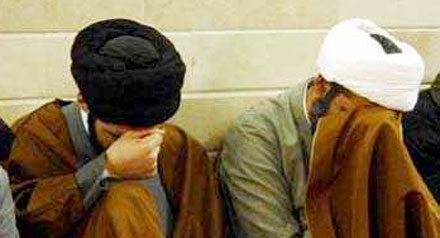
Even before last year’s post-election tumult, it was palpable to almost anyone who had spent serious time in Iran that revolutionary rot had set in long ago. While every country has its tales of corrupt clergymen, disillusioned government officials, drug-addicted youth, and rampant prostitution, in a theocracy that rules from a moral pedestal these stories have long served to highlight the government’s hypocrisy and hollow legitimacy.
Although Iran’s amateur cell-phone journalists did a heroic job chronicling scenes of extraordinary courage and harrowing government brutality — a record that is “more important than all of the history of our cinema,” acclaimed filmmaker Mohsen Makhmalbaf graciously put it in a Wall Street Journal — what is impossible to capture on video is the dismay of Iran’s traditional classes who continue to believe strongly in Islam, but have lost their faith in the Islamic Republic.
Growing up in a household where my devoutly religious, veiled grandmother had an aversion to Shiite clergy, I learned from a young age that piety was not always, indeed not often, an indicator of support for theocracy. Two decades later, based in Tehran with the International Crisis Group, I came to learn through daily interaction with Iranian officials that they, too, had their doubts.
While jumping through bureaucratic hoops at the Iranian Foreign Ministry several years ago to retrieve my confiscated passport (a wrist slap compared with what many of my contemporaries later endured), I was taken aback to find that nearly every office I entered had BBC Persian or Rooz — considered subversive, anti-government websites, which are now filtered — on their computer screens.
In meetings, especially with Western officials, Iranian officials would parrot the party line. But in private conversations, out of earshot of their bosses, a different narrative could often be heard. A former Iranian ambassador in Asia once confided to me over dinner in Paris that as “naive” young revolutionaries, he and his friends had grossly underestimated how difficult it would be to govern Iran and satisfy its fickle population. “We didn’t appreciate at the time,” I was surprised to hear him say, “the enormous challenges the shah had to deal with.”
I used to recount these tales to a friend of mine, a devout, American-educated professor of political science at Tehran University who ran in government circles. He would smile and recount for me his own stories. “Everyone hates the regime,” he told me once, only half-jokingly. “Even the regime hates the regime.”
The revolutionary slogans that once inspired a generation of Iranians have become banal background noise for a population born predominantly after the revolution. Amid the bustle of a Friday prayer ceremony in Tehran several years back, I saw a rumpled, 50-something man furiously pumping his fist up and down and chanting something unintelligible. No one seemed to pay any attention to him. As he passed me, his words became clearer:
“Marg bar Amrika peechgooshtee sadt toman! Marg bar Amrika peechgooshtee sadt toman!”
“Death-to-America screwdrivers, 100 toman! Death-to-America screwdrivers, 100 toman!”
I was curious to check out his merchandise — cheaply priced, anti-imperialist household tools — so I flagged him down. Sensing his first sale, his eyes lit up.
“How many do you want?” he asked enthusiastically. He had a basket of at least 30. I grabbed one and took a closer look. Turning the screwdriver in my hand, I searched in vain for the words “Death to America.”
“Where is the ‘Death to America’?” I asked.
He shot me a puzzled look. “You want one with ‘Death to America’ written on it?”
“Isn’t that what you said?”
“That was just an advertisement!” he explained to me with a wave of the hand, incredulous at my naiveté. “I said, ‘Death to America! Screwdrivers for 100 toman!'” Two altogether separate sentences, he argued. The small crowd we had attracted shared his incredulity and verified that there indeed had been a pause between the two phrases.
“Come back next week,” he said. “Perhaps I’ll have some for you then.” (Sharia has not yet replaced the laws of supply and demand in Iran.)
Many close observers of Iran confess to being baffled at the country’s complex politics, its internal contradictions, its cultural nuances. How is it, many wonder, that a system that has profoundly underperformed for three decades could remain in power?
The leaders of the opposition Green Movement are no doubt pondering this question today. At the height of last year’s unrest, they had hoped to recruit Iran’s disaffected officialdom and traditional classes. Some joined last summer, but many watched, and continue to watch, from the sidelines. “They wanted to see the Green Movement succeed,” said my friend, the university professor. “But they won’t make a move until things are really on the verge of change. They’re afraid.”
Too often we underestimate the sustainability of morally bankrupt regimes that have mastered the art of repression coupled with financial co-optation. In the cynical words of a scion of a powerful clerical family, who told me once: “When you have control over the oil revenue, you can run this country with a few million supporters and 20,000 people who are willing to kill and die for you.” Maybe, though that formula did not work for the shah.
There is some wisdom in the old adage that Iran’s largest political party is the hezb-e baad, the “party of the wind.” Iranians have historically gravitated toward where the most powerful political winds are blowing. As anti-government demonstrations engulfed Tehran last summer, I thought of the sloganeering screwdriver salesman from Friday prayers.
“Death to the Dictator!” I pictured him saying, crying to the parched crowds. “Watermelon juice for 500 toman!”
That likely didn’t happen. Not just yet. But maybe one day soon.
First published in foreignpolicy.com.
AUTHOR
Karim Sadjadpour is an associate at the Carnegie Endowment for International Peace.






